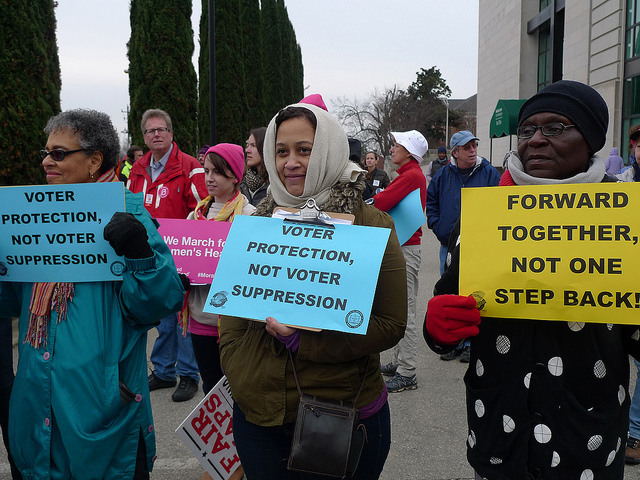
Support justice-driven, accurate and transparent news — make a quick donation to Truthout today!
In what is being called a “huge win for voting rights” and a resounding defeat of “Jim Crow-era tactics,” a federal judge on Wednesday struck down a major voter ID law passed by the Republican-dominated Texas state legislature on the grounds that it would place a “disproportionate burden” on black and Latino voters.
Nelva Gonzales Ramos of the United States District Court for the Southern District of Texas had previously found that the original version of the Republican bill — which was passed in 2011 — was designed with discriminatory intent. In the face of legal challenges, the Texas GOP attempted to soften the law.
These attempts did not go far enough, Ramos ruled on Wednesday, arguing that the changes to the legislation were superficial, and that its discriminatory nature remained “essentially unchanged.”
The New York Times summarized the ruling and its implications:
The decision was only the latest chapter in a yearslong court battle over the state’s voter ID rules, and comes amid concerted efforts by the Trump administration to enact tougher voting restrictions. The stakes are particularly high for Texas: As a result of previous court rulings, the state could be forced to undergo federal oversight of its election procedures…
Judge Ramos not only tossed out the revamped voter ID law, but also struck down the original version, known as Senate Bill 14. She did not rule on whether Texas’ election laws would be put under federal oversight, but said she would consider the issue during the next phase of the case.
Ramos’s ruling was celebrated by civil rights groups and activists.
Vanita Gupta, president and CEO of The Leadership Conference on Civil and Human Rights, said in a statement Wednesday that Ramos’s decision to block enforcement of the Texas law “is an important victory for voting rights and those who fight for them every day.”
“Despite the Trump administration’s reversal of a longstanding [Department of Justice] position that Texas engaged in intentional race discrimination in enacting its voter ID law, the court today threw out both the 2011 law and the 2017 version that did not fix the original law’s racially discriminatory purpose,” Gupta concluded. “It’s time for Congress to finally act to restore the Voting Rights Act, and put an end to these kinds of efforts that deny voters of color access to the ballot.”
A recent analysis by the Brennan Center found that “at least 99 bills to restrict access to registration and voting have been introduced in 31 states” in 2017 alone.
Highlighting this research on Wednesday, Sen. Bernie Sanders (I-Vt.) declared on Twitter: “The real crisis we face is not voter fraud. It is voter suppression.”
Civil rights groups have also expressed alarm at the Brennan Center analysis, which came amid the Trump administration’s push for “suppressive policies” under the guise of rooting out mythical “voter fraud.”
Further, as Buzzfeed’s Chris Geidner notes, under Attorney General Jeff Sessions the Department of Justice has “reversed the position it held during the Obama administration beginning in February, when it stopped backing the challengers to the [Texas] voter ID law.”
In a series of tweets, Kristen Clarke — president and executive director of the Lawyers’ Committee for Civil Rights Under Law — celebrated the Wednesday ruling while cautioning that the fight against voter suppression efforts at the state and federal level is sure to continue.
“This is the most important victory yet in the long-standing battle against one of the worse voter suppression measures,” Clarke declared. “States like Texas, Georgia, North Carolina, and others have relentlessly pursued voter suppression. We will continue to use the courts to fight!”
Speaking against the authoritarian crackdown
In the midst of a nationwide attack on civil liberties, Truthout urgently needs your help.
Journalism is a critical tool in the fight against Trump and his extremist agenda. The right wing knows this — that’s why they’ve taken over many legacy media publications.
But we won’t let truth be replaced by propaganda. As the Trump administration works to silence dissent, please support nonprofit independent journalism. Truthout is almost entirely funded by individual giving, so a one-time or monthly donation goes a long way. Click below to sustain our work.